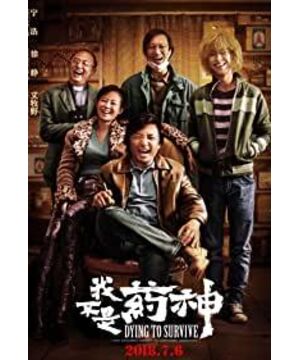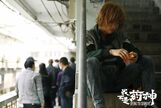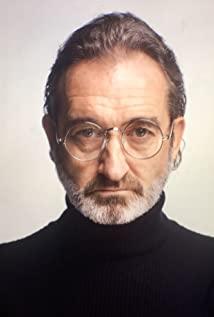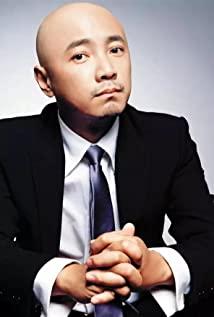Since the release of Indian films such as "Wrestle, Dad", people have often wondered when China will be able to make good-looking and socially critical films. Especially several of our neighbors, South Korea ("The Furnace"), India, and Japan have every year there is no shortage of commercial masterpieces with great social significance and good narrative, but for various reasons, China has been unable to make movies that face reality. , which has also been criticized by audiences and film critics.
So, when I was able to see "I'm Not the God of Medicine" on the big screen, when we walked out of the theater, everyone said to each other, maybe, we can also have a "Dallas Buyers Club" of our own, although in the spirit of On the other hand, "I'm Not the God of Medicine" is very different from "Dallas" - "Dallas" is American at first glance, and it is too American, full of cowboy-style anarchism and wildness; and "The God of Medicine" is Too Chinese, sometimes too down-to-earth, full of compromises and unwillingness.
It is true that as the first independent feature film of the new director Wen Muye, "I Am Not the God of Medicine" still has some shortcomings in the second half, such as a little bit of sensationalism, a little full soundtrack, and a little redundant individual plots—— However, most of the time in the film, it reflects a very skilled and attentive narrative advancement; especially in many screenwriters' structures, the image of Cheng Yong played by Xu Zheng is very full: for example, at the beginning of the film, Cheng Yong Because he was going to be rough with his ex-wife, he was almost beaten by his uncle (Yi Weiwei), who was a police officer. Facing the fierce uncle, Cheng leaned against the wall with a look of panic; but at the end, when they met for the third time At that time, Cheng Yong, who was bullying the soft and fearing the hard before, was full of anger because his subordinates had a major change in the process of selling drugs. He pushed his uncle directly to the wall and asked him, "He just wants to live, is this wrong?" Although the echo before and after reflecting the growth and transformation of the characters is not a profound skill, in the two direct conversations with the uncle, Xu Zheng's character transformation, Zhou Yiwei's inner transformation, the advancement of the main plot, and the advancement of the auxiliary plot are all taken into account. Now, for a domestic film that has been criticized for its bloody plot and rough production, "The God of Medicine" is quite accurate in terms of story control.
In addition, the performances of several supporting characters in the film are also very exciting. The leukemia man played by Wang Chuanjun is not only dull and calculating as a patient, but also cowardly and cowardly, very happy, and at the same time reflects the very "Shanghai" characteristics (this may be because he is also a Shanghainese). ). Another very happy character in this film is Yang Xinming, who plays Father Liu. Yang himself has always played roles such as farmers and township cadres. This time, playing a gentle and English-speaking priest, not only The characters are well-drawn, and in many scenes, their lofty and holy image brings a sense of "serious" humorous contrast.
In this sense, the director's casting is very successful, and its core lies in "contrast": the leukemia man played by Wang Chuanjun, who is 1.87 meters tall, hides a slightly wretched, petty citizen, and a small person under his tall body. He has a humble and sincere family view, and his physical actions are rather uncoordinated and clumsy, but he also has his own shrewd mind. Finally made the switch. Inspired by the lofty moral concepts of religion, Father Liu did not hesitate to break the law to help Xu Zheng resell "fake medicines", which seemed out of place in the five-person drug trafficking group that either wanted to survive or make money. A believer with a bit of a nerd temperament, he always follows behind everyone in everything and follows the teachings; but when facing the "real and fake drug dealers", he has become extremely courageous to stand up and stand on the podium On the other hand, this courage and the humble image of the priest also form an accurate but dramatic contrast. It can be said that the director and screenwriter put a lot of thought into depicting each character, whether it is Xu Zheng, who is the absolute protagonist, or a supporting role with only a dozen lines, from the positioning of the characters to the details of the performance of the lines.
To be honest, "I'm Not the God of Medicine" is based on real stories, and the subject matter is quite sensitive. Just like those Indian films and Korean films, it touches a very ambiguous story area: between law and human relationships , Is it the law, or the love and fate? For most people, the fact that the law is greater than the love is the essence of the rule of law society and the rule of law system - this is also where the final ending of the film does not fit the real reality; but in the face of complex, changeable, and even cruel reality In the world, the audience will also begin to identify with the protagonist - he has changed from an ordinary mediocre who just wanted to make some money to perform surgery on his father and make the child live a little better, and finally turned into a person who is determined to lose money and illegally smuggle medicines" "Saints", although this change is a little jerky, the questioning of "law and emotion" brought about by the change is already a depth that is rarely seen in domestic commercial films.
In fact, there are not a few Chinese films that discuss "law and love", such as "The Case of Qiu Ju", "The Defendant Shan Gang Ye", "Court on Horseback", all of which are masterpieces that explore the relationship between China's grassroots justice and human feelings , as a "serious" film, they question depth and thinking angle, which is more profound, and the film's artistic presentation is also better. "I'm Not the God of Medicine" is dedicated to exploring serious themes in the framework of commercial films, and the questioning and thinking of natural films will undoubtedly be thinner. But when the leukemia man played by Wang Chuanjun finally came to the end of his life, Xu Zheng, who had bought life-saving medicine in India, suddenly walked into the smoky street full of Hindu statues. After the protagonist was triggered, the reaction was finally completed. The transformed play is very poetic and metaphorical. Although it is a little straightforward, it is a glimpse, which shows that the director can still control special scenes with relatively high artistic completion requirements in addition to the purely commercial film routine. Ability.
"I'm Not the God of Medicine" is indeed a little weaker than those films that discuss law and human relations with more profound thinking, more restrained aesthetics, and more realistic stories; but if you consider that legal issues are not the core issue of this film, And if the film must be understood in the context of a commercial film, "The God of Medicine" can be called the most conscientious and sincere domestic film from 2018 to the present. For domestic films full of shoddy productions, "The God of Medicine" has socially critical themes, meticulous characterization, boldness to challenge the standards of censorship, and even narrative advancement that echoes fluently. Perhaps it really is the treatment of increasingly vulgarized A good medicine for the domestic film market.
View more about Dying to Survive reviews











